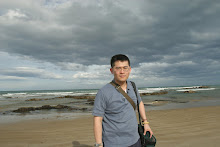Lygon Street pub corner
Rather bustling atmosphere in this dying part of town
Sony A7RV
FE 14mm f1.8 GM
I come across this argument in a local street photography forum "Edit or no edit"
"If you
post process, it doesn't mean that you haven't learned the equipment or your
style. In fact some who post process know their equipment intimately knowing
very well the bounds of the tools available to them.
Also, post
processing predates digital by a long way. Are those who dodged and burned in
the darkroom not real photographers, or photographers with extra skill sets?
If you
take what you can get out of in camera jpeg as a strict constraint, that means
that you have accepted the choices your camera's engineers made for
prioritising highlights, shadows, saturation etc. Even if you're a 100% manual
shooter, you have accepted that you're going to let the camera make a lot of
decisions on processing for you.
If you
shoot raw and post process, you are no less of a photographer because of it. If
you choose an in camera preset or film sim, again you have accepted someone
else's choices for final processing.
If you
have files from 2008 in low light, they look noisy because digital cameras
sucked at low light in 2008. If you feed those old photos into software in 2023
that can recognise sensor noise and correct it with a high degree of accuracy,
it doesn't mean that you didn't know how to use a camera in 2008. You may have
just accepted noise as a trade-off for a reasonable exposure.
If you
have a camera released this year and push iso in a difficult situation to get
the shot rather than not, knowing that software in 2023 can correct sensor
noise really well, it doesn't mean that you didn't learn your equipment. It
could just mean that you know enough to get the shot rather than not."
Check out Candid 216 and FACE OFF


Good photography and good explanation of what for me is an art, knowing how to take good photos.
ReplyDeleteBest regards.
It is the 90's style of photography I am still into.
DeleteOf course we should use post processing. We had an image in mind when we hit the shutter, and post processing allows us to get closer to that picture. Just because we post process does not mean we push colors to unreal limits, or distort photos beyond recognition. BTW, I like all the action you have in your photo.
ReplyDeleteThank you for taking the time to write such a long comment. There are always extremes one can observe in any media platform. I found it bizarre that no edit is imposed on the photographers in the recent trend as some sort of virtue.
DeleteI have no problem with post processing. That's a good shot!
ReplyDeleteThere is so much in camera processing in digital cameras themselves by their own companies.
DeletePara eso está el posterior procesado de la imagen. Por medio del procesado eres tu el que elijes, la forma de mostrar la imagen.
ReplyDeleteUn abrazo
It comes down to the individual preference.
DeleteI'll drink to that!
ReplyDeleteLive the life.
DeleteThere is a lot to be seen in this photo when closely examined.
ReplyDeleteGreat contrast in the photo! Post processing aids you put your stamp on your work. Similar to a watermark.
ReplyDeleteLively
ReplyDeleteI am always very impressed with your photography and your knowledge. Thank you for sharing with FFO and have a great weekend.
ReplyDeleteAmbiente distendido
ReplyDeleteI like that article. The photos we take today will be seen in the future as the past.
ReplyDeleteAn excellent shot.
ReplyDeleteWhen I look at your photo I can't help wondering what they were all talking about ~ a fun moment in time caught, Roentare. As for the discussion, I firmly believe in "post processing," a term I hadn't heard before. Must be an Aussie expression.
ReplyDeleteWhen I found myself in a dark room developing film for the first time, it was magical, truly wonderful. I've never forgotten the thrill I felt when I discovered cropping and playing with the light in the pictures I printed. That's where art comes in. Thank goodness for my Biology 100 professor who insisted that every one of his students develop a roll of black and white film and print some photos. He made us do so in every course of his I took.
My guiding principle for my photographs is to create the best image I can. I try to capture the best shot under the circumstances I'm shooting in, but I will always try to make it the best finished image I can by editing. Eye issues made it impossible for me to pursue studio photography, but I kept taking photos. And now, with my double vision, it is hard for me to work with a complex camera, but my point-and-shoot Canon and my iPhone allow me to experience the fun and pleasure of photography, and editing allows me to improve my photos.
Fingers-crossed, I'll likely have my eyes operated on this fall, and then maybe I'll be able to see clearly again. How do I know when my photos are in focus? My camera makes a sound when it's focused ~ lol. We do what we can to get by!
Muy interesante. Un beso.
ReplyDelete